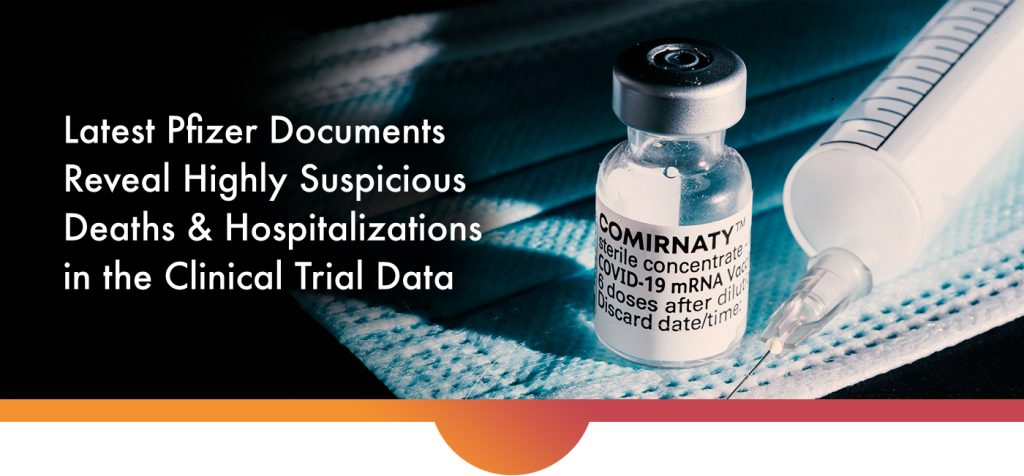

As you know from prior updates, the attorneys who represent ICAN also represent the plaintiff in a lawsuit against the FDA to obtain Pfizer’s Covid-19 vaccine documents. After a historic win, the FDA was forced to produce tens of thousands of documents every month.
The latest July batch of documents consists of case report forms (CRFs) of 212 individuals who participated in Pfizer’s clinical trial and some are highly concerning.
Ten participants whose reports were produced in this tranche experienced highly concerning health events. All the adverse events (AEs) listed below happened after receipt of the vaccine (either the individual was in the original vaccine group or was vaccinated after the unblinding of participants who had originally been in the placebo group).
- An approximately 70-year-old man was hospitalized with atrial fibrillation, pulmonary emboli (blood clots in the lungs), and occlusive thrombus (blood clot) in his right calf just 2 days after his first injection despite no prior medical history of cardiovascular issues as confirmed by Pfizer. Pfizer indicated the blood clots were due to “Prolonged travel in the car.”
- An approximately 49-year-old man with high cholesterol, but no other related health issues, had a myocardial infarction (heart attack) 11 days after his second dose, which apparently caused a biking accident. It appears that he was hospitalized for 16 days. Pfizer reported it as “not related” to the vaccine and, instead, stated it was “related to cardiovascular risk.” Also of interest is Pfizer’s observation that his two doses were more than 21 days apart, but yet it is not clear that this was recorded as a medication error. Notably, no reactogenicity e-diary information was collected for this subject despite this being part of the clinical trial protocol (to collect a diary of symptoms experienced after injection).
- An approximately 48-year-old man reported that his partner was pregnant two and a half months after his second dose. His partner suffered a miscarriage three weeks later. But, as you can see in the records, Pfizer’s primary concern appeared to be figuring out whether the partner was also in the study and, if so, ensuring this adverse event was reported only once. Again, no reactogenicity e-diary information was collected for this subject.
- An approximately 70-year-old male with a history of heart and kidney disease was hospitalized with atrial fibrillation and acute kidney injury 12 days after his second active dose. The individual inputting the AE information into his CRF actually admits to making up the cause of adverse events. When questioned why “dehydration” was listed as the cause of the acute kidney injury, the clinical trial staff member eventually admits that dehydration was “what the PI [Principal Investigator of the trial] thought [the kidney injury] could be attributed to, but dehydration is not in the medical record for this instance and was not reported by the patient.” Again, no reactogenicity e-diary information was collected for this subject.
- An approximately 68-year-old man was hospitalized with atrial fibrillation just 1 week after his first dose. He had hypertension and dyslipidemia (high cholesterol), but no other related health issues. No reactogenicity e-diary information was collected for this subject.
- An approximately 68-year-old man committed suicide just 4 days after receiving his first dose of the vaccine (after having received two doses of placebo five months earlier). While he did have a history of depression, the study criteria excluded participants with recent or active suicidal ideation/behavior, and comments in his CRF indicate that Pfizer checked his history for “suicidal attempts or recent hospitalization due to depression” and found none.
- An approximately 85-year-old man with a history of heart disease died suddenly of atherosclerotic cardiovascular disease two months after his second injection. In reporting this adverse event, one Pfizer employee wanted to confirm if the toxicity grade “should be 5 as the AE was Fatal.” Another employee responds, “Toxicity grade should be 5-Fatal, but 4 is the highest radial that can be selected.” It’s not entirely clear what this means. No reactogenicity e-diary information was collected for this subject.
- An approximately 85-year-old man with a history of heart problems, among numerous other health issues, was hospitalized with worsening aortic stenosis (a heart issue) 15 days after his first injection and died of cardiac arrest 10 days later. Once again, no reactogenicity e-diary information was collected for this subject.
- An approximately 56-year-old woman with a history of heart disease, including congestive heart failure, diabetes, a stroke in 2019, and numerous other health issues, was hospitalized with worsening coronary heart disease 11 days after her first dose. Records indicate her “end of participation was 28 Aug 2020. Subject withdrawn due to SAE [serious adverse event] no longer meets the eligibility requirement of inclusion 3,” which required “healthy participants.” Evidently, this individual’s 2019 stroke, diabetes, and history of heart failure was not considered enough to disqualify her as unhealthy, but worsening heart disease, which occurred right after the vaccine, was. Predictably, her adverse event was marked “not related” to the vaccine and, instead, was absurdly attributed to “Hypertensive cardiovascular disease or arteriosclerotic heart disease.” In other words, her worsening heart disease was caused by heart disease.
- An approximately 54-year-old man was hospitalized with heart failure 26 days after his second dose. He recovered but ended up back in the hospital six weeks later, where he ultimately died of congestive heart failure. Despite the trial inclusion criteria which required that participants be deemed “healthy,” this man had a number of serious health issues prior to the study, including chronic obstructive pulmonary disease, acid reflux, heartburn, bilateral leg edema, hypertension, irregular heartbeat, a defibrillator implant, idiopathic cardiomyopathy, and congestive heart failure, but was still allowed to participate in the study.
As you may have already guessed, despite the fact that most of them suffered heart damage, which is a widely-known side effect of the vaccine, Pfizer determined that none of these events were related to the investigational vaccine. And let’s not forget that FDA had access to all of these records before granting licensure.
Pfizer’s trial included over 43,000 people but, to date, FDA has produced only 785 case report forms for less than 2% of the trial participants. If and when more are produced, ICAN will continue to update our supporters.
In the meantime, see the links below to catch up on some of ICAN’s other updates on the Pfizer documents:
- BREAKING: ICAN’S ATTORNEYS SCORE ANOTHER MAJOR WIN AGAINST FDA WITH PFIZER AND MODERNA COVID-19 VACCINE DOCUMENTS
- ICAN’S ATTORNEYS UNCOVER EARLY PFIZER VACCINE STUDY REVEALING ALARMING SYSTEMIC REACTIONS IN RATS
- PFIZER ADDS 600 FULL-TIME EMPLOYEES TO HANDLE VOLUME OF REPORTED ADVERSE EVENTS
- ICAN ATTORNEYS OBTAIN ANOTHER SET OF PFIZER DOCUMENTS
- FDA ASSIGNED PFIZER’S COVID VACCINE A LICENSE NUMBER MONTHS PRIOR TO ACTUALLY LICENSING IT
- FDA SEEKS TO HIDE PFIZER’S DOCUMENTS FROM THE PUBLIC
